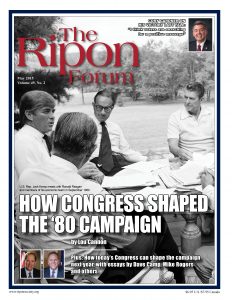Latest edition of Republican journal features essays by Lou Cannon, David Winston, Dave Camp, Mike Rogers & others

WASHINGTON, DC – After Republicans won control of Congress last November, there were a number of stories written about what the new majority might achieve in the coming year. While there were differences of opinion about the proposals that might be pursued, there was a general consensus that the GOP didn’t have much time to act.
As Kristina Peterson wrote in the Wall Street Journal the day after the election, “Republicans in the House and Senate will have a limited window to try to pass legislation before their efforts are overshadowed by the 2016 presidential campaign.” Peterson’s story typified the analysis at the time, and was based on recent campaigns which saw the nominees of both parties set the agenda while Congress faded into the background of the debate.
With the first presidential debate set for August 6th, many Republicans are now wondering whether history will repeat itself again. Will the House and Senate become passive bystanders and watch the political focus shift to the campaign trail? Or will the GOP Majority defy history by shaping the agenda on Capitol Hill? Precedent exists for them to do just that. In its latest edition, THE RIPON FORUM not only looks at that precedent, but examines areas where Republicans have the opportunity to seize the initiative today.
Leading the coverage is award-winning journalist and author Lou Cannon. As Cannon writes in the cover essay, in 1980 then-candidate Ronald Reagan embraced a plan authored by U.S. Rep Jack Kemp and U.S. Sen. William Roth to cut tax rates across-the-board. The Kemp-Roth tax plan became the economic centerpiece of Reagan’s victorious campaign and helped define the first two years of his presidency. According to Cannon, it could also serve as an example for Congressional Republicans today. “Kemp-Roth showed that a party out of power in the White House can lay down markers for what it will do if it regains executive control,” he writes.
Veteran strategist David Winston agrees. Pointing to data which reveals that voters want Congress to propose policies to improve the economy rather than oppose President Obama, Winston argues in another essay that Congressional Republicans can shape next year’s debate by putting forward their own agenda this year. “If the 2010 and 2014 elections taught us anything,” he writes, “it is that in this political climate, you win elections by winning issues.”
The latest edition of the FORUM looks at several of these issues with essays by some of Washington’s leading thinkers and policy entrepreneurs, including former Ways & Means Chairman Dave Camp, who offers his expert analysis about tax reform and how Congress can impact the debate heading into next year. “The current Republican-led Congress has an opportunity to have a significant impact on the 2016 elections with the tax reform effort underway in the House Ways and Means Committee and the Senate Finance Committee,” the Michigan Republican pens. “Simplifying our complicated tax code and lowering the tax burden for both businesses and American families will spur job creation and improve the economic security of all Americans.”
In addition to Camp, former House Intelligence Committee Chairman Mike Rogers also shares his thoughts on how the GOP Majority can impact the coming presidential campaign in the area of national security. “Strategically speaking,” Rogers writes, “we are ceding ground to the Chinese, Russians, Iranians, and to terrorists. All of this has a negative impact on our future … Congress can take some important steps this year to turn back this dangerous trend threatening America’s leadership role in the world.”
Joining Camp and Rogers with essays on the topic are former Deputy Secretary of Health and Human Services Tevi Troy, who writes that Republicans need to develop a governing agenda that includes “targeted health care reform,” and, Robert D. Atkinson, who serves as President of the Information Technology & Innovation Foundation and argues that the GOP Majority should look for ways to “help enterprises and high-growth start-ups become more productive, innovative and competitive.”
Also featured in this latest edition of THE RIPON FORUM is former Senator Tom Coburn, who writes about the effort he is supporting to convene a Conference of States “to return the country to its original vision of a limited federal government.” Continuing the FORUM’S year-long commemoration of its 50th anniversary, former Ripon Society President Lee Huebner writes about the founding of the Society and how one of the group’s organizing principles was “a renewed commitment to the advancement of Civil Rights.” Also, Jared Meyer of the Manhattan Institute looks at three first-term GOP governors presiding over blue states and explains why tax reform might be the key to their success. And in the latest Ripon Profile, freshman Senator Cory Gardner discusses the key to his victory last fall and what voters are looking for from Washington, DC.
THE RIPON FORUM is published by The Ripon Society, a public policy organization that was founded in 1962 and takes its name from the town where the Republican Party was born in 1854 – Ripon, Wisconsin. One of the main goals of The Ripon Society is to promote the ideas and principles that have made America great and contributed to the GOP’s success. These ideas include keeping our nation secure, keeping taxes low and having a federal government that is smaller, smarter and more accountable to the people.



